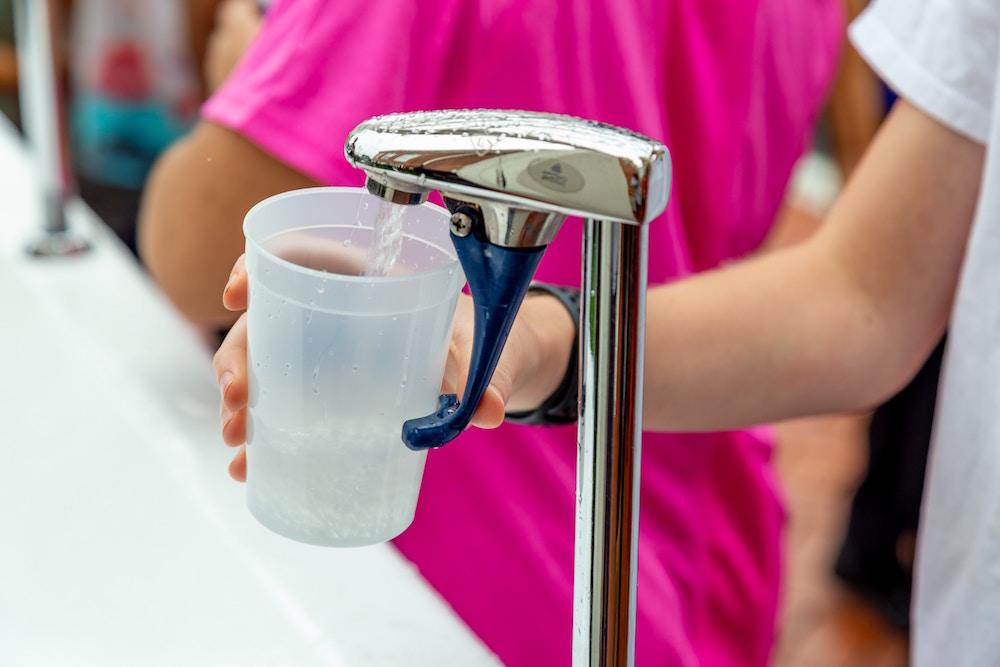
We know that all living things need water to survive. Water makes up more than half of our body weight and without it our bodies would stop working properly. While many children do drink water, parents sometimes also offer their children milk or fruit juices thinking they need the calcium or extra vitamins. And many children also indulge in sugar-sweetened drinks such as juice drinks, soft drinks and flavoured milks. Here’s why water is still the best choice to satisfy your child’s thirst.
Benefits of drinking water
When your children drink water regularly throughout the day, they will stay hydrated. This is especially important in our hot climate and when your children are very active as water helps to regulate our internal temperature. Our blood, which carries life-giving oxygen to our cells, contains a lot of water. Water is also in our lymphatic system, which is an important part of our immune system, keeping us healthy and helping us to fight off illnesses. In addition, we need water to properly digest our food, eliminate waste and to help avoid constipation.
Our brains are made up of 85% water and water is required for all of the brain’s activities, from the transportation of nutrients, to the production of neurotransmitters and hormones. Research has shown that when we are dehydrated, we have a hard time staying focused and our memory is impaired. This is especially important for children’s growing brains.
Do kids really need to drink milk?
Milk has long been touted as a necessity for strong bones and teeth. While dairy products do contain the highest level of calcium per serving, other foods such as dark leafy greens, beans and salmon also provide a source of calcium. In addition, research has shown that vitamin D is required with calcium for optimum bone health. Getting sufficient weight-bearing exercise is also an important factor for building healthy bones.
While milk does provide some benefits, many people find it difficult to digest because they are lactose intolerant. In addition when children are drinking an excessive amount of milk, they are missing out on the nutrients they will get from eating a variety of other foods. According to paediatrician Dr. Bratt “After one year, a glass a day is more than enough and even that is not needed.”
What about fresh-squeezed juices?
Fresh squeezed juices and 100% unsweetened fruit juices do provide nutrients. However since the bulky fiber is extracted from the whole fruit, it is easier to consume larger quantities of juice. The natural sugar in these juices can lead to spikes in blood sugar and because many children prefer the taste of juices to water, they may easily exceed their daily caloric intake with juice. If you want your children to benefit from the vitamins and minerals present in fruit, it is better to encourage them to eat the whole fruit instead of juice.
Soft drinks and other sugar-sweetened drinks
While it is widely accepted that sugary soft drinks have little nutritional value and provide empty calories, many other sugar-sweetened beverages such as juice drinks, iced teas and flavoured milk drinks may also contain high amounts of added sugar. Be careful to not fall for the marketing language on the front of the package. It is important to look at the Nutrition Facts label on the drink to see how much added sugars your children are really consuming.
The World Health Organization states, “The consumption of sugar-sweetened beverages has been suggested as a contributory factor to the rising levels of childhood obesity being recorded in many countries worldwide.” So it is best to avoid these drinks. Children learn best by example, so get everyone in the family drinking water. It helps if water is easily accessible by keeping reusable water bottles or drinking cups on a shelf in the fridge or cupboard the children can reach. Carry reusable water bottles with you when you are on the road and keep a pitcher of water on the table during family meals. Ultimately it is important to teach children that water is the best drink for their health.
